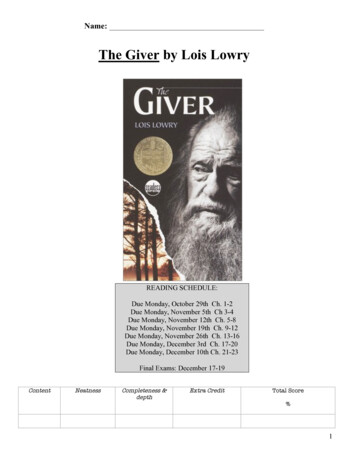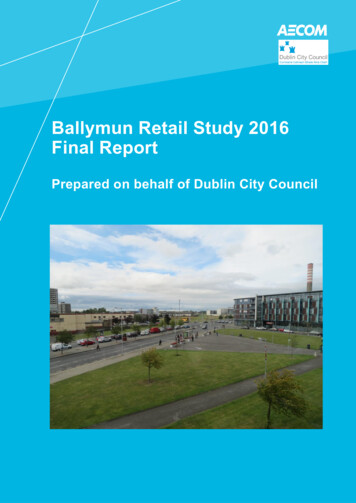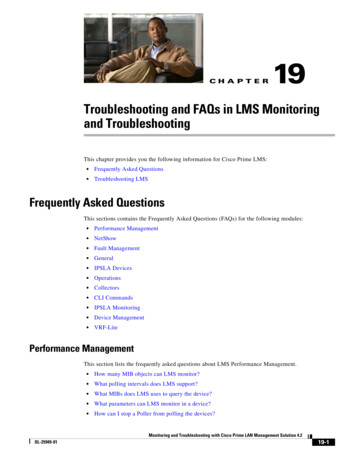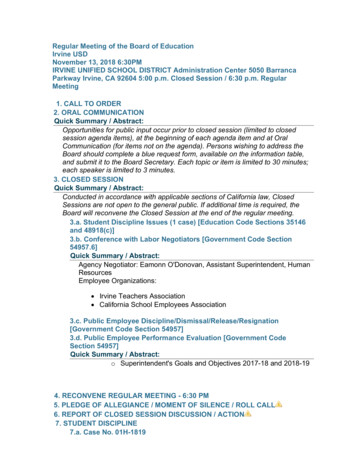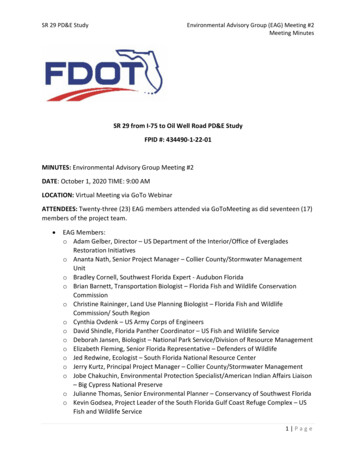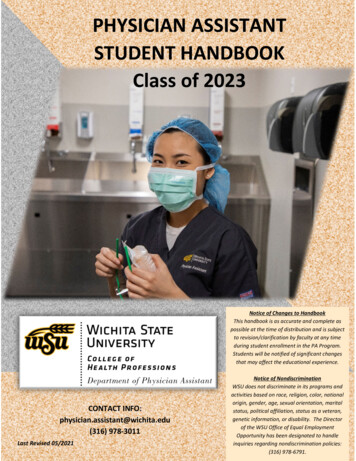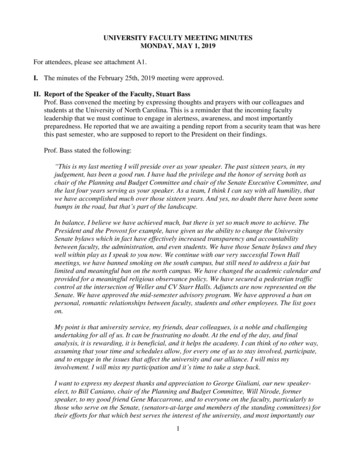
Transcription
UNIVERSITY FACULTY MEETING MINUTESMONDAY, MAY 1, 2019For attendees, please see attachment A1.I. The minutes of the February 25th, 2019 meeting were approved.II. Report of the Speaker of the Faculty, Stuart BassProf. Bass convened the meeting by expressing thoughts and prayers with our colleagues andstudents at the University of North Carolina. This is a reminder that the incoming facultyleadership that we must continue to engage in alertness, awareness, and most importantlypreparedness. He reported that we are awaiting a pending report from a security team that was herethis past semester, who are supposed to report to the President on their findings.Prof. Bass stated the following:“This is my last meeting I will preside over as your speaker. The past sixteen years, in myjudgement, has been a good run. I have had the privilege and the honor of serving both aschair of the Planning and Budget Committee and chair of the Senate Executive Committee, andthe last four years serving as your speaker. As a team, I think I can say with all humility, thatwe have accomplished much over those sixteen years. And yes, no doubt there have been somebumps in the road, but that’s part of the landscape.In balance, I believe we have achieved much, but there is yet so much more to achieve. ThePresident and the Provost for example, have given us the ability to change the UniversitySenate bylaws which in fact have effectively increased transparency and accountabilitybetween faculty, the administration, and even students. We have those Senate bylaws and theywell within play as I speak to you now. We continue with our very successful Town Hallmeetings, we have banned smoking on the south campus, but still need to address a fair butlimited and meaningful ban on the north campus. We have changed the academic calendar andprovided for a meaningful religious observance policy. We have secured a pedestrian trafficcontrol at the intersection of Weller and CV Starr Halls. Adjuncts are now represented on theSenate. We have approved the mid-semester advisory program. We have approved a ban onpersonal, romantic relationships between faculty, students and other employees. The list goeson.My point is that university service, my friends, dear colleagues, is a noble and challengingundertaking for all of us. It can be frustrating no doubt. At the end of the day, and finalanalysis, it is rewarding, it is beneficial, and it helps the academy. I can think of no other way,assuming that your time and schedules allow, for every one of us to stay involved, participate,and to engage in the issues that affect the university and our alliance. I will miss myinvolvement. I will miss my participation and it’s time to take a step back.I want to express my deepest thanks and appreciation to George Giuliani, our new speakerelect, to Bill Caniano, chair of the Planning and Budget Committee, Will Nirode, formerspeaker, to my good friend Gene Maccarrone, and to everyone on the faculty, particularly tothose who serve on the Senate, (senators-at-large and members of the standing committees) fortheir efforts for that which best serves the interest of the university, and most importantly our1
students. My deepest thanks go to Provost Berliner, Liora Schmelkin, Cliff Jernigan, TerriShapiro, for their wise guidance and counsel over the years.To all of you, we will face many challenges in the coming months and years ahead. I want tothank all of you for your support and I wish each of you good health, good luck and muchsuccess. Keep fighting the good fight and persist, persist. I thank you all very much.”III. Report of the Provost, Herman A. BerlinerThe Provost thanked George Giuliani for his service as chair of the Senate Executive Committeeand congratulated him on his recent election to serve as Speaker of the Faculty.The Provost also congratulated Daniel Seabold for returning as Parliamentarian, and MargaretAbraham, the new Harry H. Wachtel Distinguished Teaching Professor for the Study of NonviolentSocial Change.The Provost welcomed Cornell Craig, the new Chief Diversity and Inclusion Officer. The Senatewill also begin the process to change its bylaws to create a seat for the CDIO. We now must makesure that this position is woven into the fabric of everything that happens at the university. TheCDIO should be invited to meet with department chairs, Departmental Personnel Committee(DPC) chairs, and the Faculty Personnel Board (FPB) chairs.Regarding new first year students, the Provost reported that we are very cautious, this is a highlycompetitive market with institutions that are still raising their discount rate. The Excelsior Programhas made a difference. This is a competitive time, and we are doing everything we can to ensure wemeet our target. The Postbaccalaureate program, students taking courses that they didn’t take as anundergraduate with the hope of entering Medical School or another health field, is helping.Applications for this program are up substantially.The Provost reported that it is still too early to tell the number of new transfer students. Transferstudents are the most price sensitive population that is out there. Many of them are used to thetuition rate they had at Nassau Community College, Suffolk Community College, QueensboroughCommunity College, etc. Transferring to any private institution can become a shock to the system.There are institutions out there on Long Island that are offering transfer students the equivalence of50% more in terms of their scholarship and are competition for us. The transfer market is verydifficult.The Provost reported that we are doing well with regard to graduate students with the exception ofthe Frank G. Zarb School of Business. We have lost a substantial number of our international(Chinese) students. For next year, international graduate students will be down making itchallenging for us to meet our graduate targets. We are hoping to increase the domestic studentscoming to the business school, and at least to some extent, mitigate the loss of internationalstudents. This loss may be short term, as we now have a partnership with INTO, which is apathways program and a very successful private effort to recruit students internationally and bringthem to institutions in the United States. Frank Gaughan is the Academic Director of the INTOeffort at Hofstra. This is a program that has very good oversight and will be very helpful to us.The Provost reported that the first time he was the Dean of the business school, he did all of thelocal student recruitment for the MBA program at Hofstra. Our competition now is no longer juston Long Island or New York state. It is now nationally, globally, and online in some pivotal areas2
which are a key part of our graduate enrollment. More than 50% of the MBA programs are onlineand that number is increasing. The next area that will have this type of growth in online programswill be Health Administration. We are going to have to do everything we can that our onlineprograms are as competitive and ultimately as successful as they can be. The Provost reported thathe tried this years ago with the School of Education. The Provost of Drexel University reportedthat their largest area of online programs is education. We need to do more in terms of instructionaldesign and production. In terms of sub scores, our MBA faculty are rated #1 in terms of all theschools being evaluated. We need to work very hard that we expand fully into this market, as this isway many of our students learn nowadays. Millennials will look for that work-life balance, so wemust be competitive online, and the Provost encourages everyone to think about the programs thatcan be online and what more we can do to make those programs as successful as they can be.The Provost reported that we have received the best Middle States report we’ve ever had, and hecredits the faculty. He read the following:“Overall Hofstra’s provided an excellent education to its students. The university has workednumbly through shared governance to examine areas where the student experience can beimproved inside and outside the classroom. It has used the opening of the new schools andprograms as an opportunity to embrace new forms of experiential learning and to createinnovated curricula dynamic practice opportunities. There is strong evidence that regularassessment is now used to form program development, strategic planning and budgeting.”The Provost reported that we have received accommodation during this visit for assessment, as wedid during the last Middle States report for assessment, and he stated that there is no otherinstitution he is aware of across the country, which has received twice in a row, accommodation onassessment. In fact, where institutions have their greatest difficulty is in outcomes assessment. Wehave been very fortunate with the work of faculty and leadership because it is a tremendous amountof work. He credits Terri Shapiro, Senior Vice Provost for Academic Affairs, and before her, RalphPolimeni, and Barbara Bohannon who have made all the difference. Our assessment is as robust asany institution around. The Provost continued:“The culture at Hofstra now seems to equip the school to whether economic and enrollmentchallenges in the northeast better than most peers and to enable the university to continue toflourish in the coming years. The team was impressed by the leadership team at Hofstra, thatbecause of long tenure, and deep commitment to the institution has been able to lead all stakeholders to participate in tough strategic decisions such as eliminating football and openingnew schools. The university has clear goals and demonstrative confidence in the execution ofits strategy.”The Provost reported on an important initiative. The revision of the class schedule, for betterclassroom utilization and better distribution of the courses. This is the same schedule, other thancommon hour, as when he started at Hofstra. It doesn’t work anymore and needs a fresh look,making it as convenient as possible for the students. The schedule as it is right now, is not anefficient use of resources. The Provost’s hypothesis is that if we schedule our classes in an efficientmanner, we won’t need more buildings on campus and still be able to bring in more studentlounges attached to departments, which are invaluable for students. We don’t use our physicalspace as efficient as we could use it, and it is time to make that change, and time to have the kind3
of schedule that works. The Provost asks that everyone review the proposal that has been circulatedand come up with suggestions.The Provost reported asked the University Senate to modify Faculty Policy Series #47 - Policy onPersonal Relationships Between Faculty/Other Employees and Students. Our present wording isoutside instructional or supervisory context. The aforementioned conduct or relationships betweenemployees and students are discouraged although not expressly prohibited by university policy.The Provost feels the aforementioned conduct relationships between employees and undergraduatestudents should just be prohibited, and suggests the policy be modified as quickly as can.The Provost reported that the Task Force on Representation in Public Spaces is in the process offinalizing its report, and offers thanks to co-chairs Meena Bose and W. Houston Dougharty, VicePresident for Student Affairs, for their leadership. He hopes this report will be the roadmap for usto follow moving forward. The report will be finalized and circulated as soon as possible.The Provost reported that the Hofstra Gala is tomorrow, May 2. The honoree is Robert Rosenthal,Chairman, Chief Executive Officer, and Chief Investment Officer of First Long Island Investors,LLC, as well as vice chair of the Board of Trustees and head of the Endowment Committee. Theevent is also important because of the recognition and celebration of the Teachers of the Year, whoare tremendous assets to the university. This year will be a record in terms of fundraising.The Provost reported on the Colonial Academic Alliance (CAA), the parallel organization to theColonial Athletic Association. Each year, the CAA sponsors an Undergraduate Researchconference, which he attended last week. There are 30 athletic conferences. Consistently, out of the30, the CAA is in the top five in terms of academic accomplishments of the students. There areonly two other athletic conferences that are consistently in the top five. Our students do extremelywell, and we are recognized as a very academically focused athletic conference. The Provost isenormously proud of the accomplishments of the students. Over 70% have a B average or above,and 40% are on either the Dean’s List or the Provost’s List. We are in very good company, as theother schools in the CAA are as follows: College of Charleston University of Delaware Drexel University Elon University James Madison University Northeastern University Towson University UNC Wilmington College of William and MaryThe Provost reported on commencement, being held on May 19, and May 20 (for the Law School): Emmy Award and multiple NAACP Image Award-winning film, television, and stageveteran Joe Morton is speaking at the Undergraduate ceremony for Hofstra College ofLiberal Arts & Sciences, School of Education, School of Health Professions and HumanServices and Hofstra Northwell School of Graduate Nursing and Physician AssistantStudies4
Wolf Bitzer, CNN’s lead political anchor, will speak at the Undergraduate Ceremony forthe Frank G. Zarb School of Business, Lawrence Herbert School of Communication, andthe Fred DeMatteis School of Engineering & Applied Science Roger Ferguson Jr., CEO of TIAA, and former Vice Chair of the Federal Reserve willspeak at the Graduate Commencement The Honorable Loretta Lynch, former Attorney General of the Unites States, is thecommencement speaker at the Maurice A. Deane School of LawIV. Report of the Senate, George GiulianiProf. Giuliani thanked Prof. Bass for the tremendous job he has done as Speaker of the Faculty. Hereported that the Senate Executive Committee this year did an excellent job due to the guidance ofProvost Berliner and Terri Shapiro, Senior Vice Provost for Academic Affairs, as well as the hardwork of the standing committee chairs: Paul Fritz, chair of the Undergraduate Academic Affairs Committee Erin Ward-Ciesielski, chair of the Graduate Academic Affairs Committee Carissa Ramirez, chair of the Student Affairs Committee William Caniano, chair of the Planning and Budget Committee Rina Hirsch, chair of the Faculty Affairs Committee Action Items1. Prof. Giuliani presented for action, the revisions to Faculty Policy Series #36 - The Use ofHuman Subjects in Research. Alan Flurkey, chair of the Institutional Review Board (IRB),reported that this is the policy that describes the operations of the IRB and lastcame up forrevision in 2012. The IRBs in institutions who receive federal grant money, are required bythe Department of Health and Human Services to provide oversight and assurance that nomore than minimal risk is encountered by participants of human subject research. For thisrevision there are three key changes expansion of the number of committee members from six to include one facultymember representing each school at Hofstra, three from HCLAS. change in quorum to at least 50% of the IRB members, including the “outside” member Requirement that all persons conducting research involving humans as research subjectsshall participate in the Collaborative Institutional Training Initiative (CITI) beforeproject approval may be grantedThe item was passed.2. Prof. Giuliani presented for action, the revisions to January session withdrawal date. Prof.Fritz, chair of the Undergraduate Academic Affairs Committee, reported that this revision willmake the procedure similar to the fall and spring semesters, which is two days before the lastsession. The item passed.3. Prof. Giuliani presented for action, the revisions to Faculty Policy Series #46 - PeerObservation of Teaching. Prof. Hirsch, chair of the Faculty Affairs Committee, reported thatadjustments were made so that the policy can apply to online course modules. Overall, the goal5
was to make the changes so that the observes would set the module which they would likereviewed in the online course. The item passed.4. Prof. Giuliani presented for action, the Online Course and Teacher Ratings (CTRs) PilotProgram. Prof. Hirsch reported that this will be a pilot program where the current CTRinstrument will be delivered online to our students, using the same procedure that is currently ineffect right now. Instructors will be able to access their own respective CTR scores andcomments immediately following the data collection. The FAC has already approved anassessment rubric to determine whether the online pilot program is similar enough to writtenCTR program to move forward, which will be presented to the faculty in the fall. Thecommittee will also move towards creating a CTR procedure applicable to online courses. Adiscussion followed and the item passed.V. Report of the AAUP, Elisabeth PloranElisabeth Ploran, President of the AAUP, reported that the AAUP continues to monitor theintroduction of the INTO program previously mentioned, as well as the student complaint emailapparatus created last semester. They continue to press for an adjunct version of the Teacher of theYear Awards. She reported that at the April membership meeting, there was a lively discussion onthe priorities for the union moving forward. The AAUP looks forward to announcing the results ofthe recent elections at its next meeting. Prof. Ploran requests that faculty who are consideringretirement should review articles 7.23 and 7.24 as there are changes occurring on September 1,2019 which will impact healthcare. Prof. Ploran reminded the faculty that they have a legalprotective right to have an AAUP representative present at any meeting with administration. Shealso reminded the faculty that if they are not receiving emails from the AAUP office, to pleasecontact them.VI. Report of the Chairs’ Caucus, Kathleen WallaceKathleen Wallace, chair of the Chairs’ Caucus, asked for a moment of silence in remembrance ofJennifer Henton, Associate Professor of English. Prof. Wallace reported that there have been veryproductive discussions amongst the chairs, other faculty and the Provost, regarding Faculty PolicySeries #43 - Hofstra University Harassment Policy. The Provost has agreed to address concerns ofthe faculty. The Chairs’ Caucus has met with Gabrielle St. Leger, the new Dean of Students andAssistant Vice President for Student Affairs, to discuss how the Office of Student Affairs can helpsupport the academic side, and to enhance retention. The Chairs’ Caucus will meet with the newCDIO, Cornell Craig, as well as the Faculty Affairs Committee of the University Senate, in the fall.Prof. Wallace reported that the caucus has had some quite productive discussions and createdresolutions of some issues involving daily work processes of chairs concerning scheduling, use ofwork flow, curriculum, and tracking dual degree majors. This involved working with the Provost’sOffice, as well as Steve Fabiani, Vice President for Information Technology, and Evan Koegl,Registrar and Director of Academic Records. At its next meeting, the Chairs’ Caucus will discussthe modifications to existing class schedule and communicate feedback to the Provost’s Office andothers on campus.VII. New BusinessThere was no new business.VIII. AdjournmentThe meeting was adjourned at 3:24 p.m.6
tuition rate they had at Nassau Community College, Suffolk Community College, Queensborough Community College, etc. Transferring to any private institution can become a shock to the system. . More than 50% of the MBA programs are online and that number is increasing. The next area that will have this type of growth in online programs
